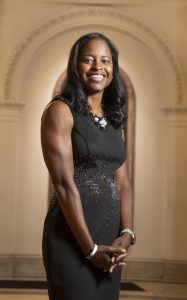By Christianna McCausland

When F. Scott Fitzgerald said, “There are no second acts in American lives,” he clearly hadn’t bet on Ebony Thompson, J.D. ’13. Thompson, 46, did not even graduate from law school until she was 34. Yet today she is Baltimore’s first woman and first openly gay City Solicitor, sworn in last January, and she has already successfully tackled some of the city’s most pressing issues, including vacant housing and ghost guns.
After graduating from Brown University with a degree in economics, Thompson took a job at UBS in New York City. But after watching the second plane hit the World Trade Center on 9/11, she realized finance was not her passion. Instead, she went into real estate. “I did well, but something was missing,” she says. Through law, she realized she could bring together her interests in real estate, finance and technology. As a career changer who was born and raised in northwest Baltimore, UBalt Law made sense.
“I knew I would get the knowledge and resources to immediately practice law,” she says.
After graduation, she went to Venable LLP, where she was happily heading down the partner track. Although she’d worked on cases with Venable’s chairman, Jim Shea, she was “shocked” when he asked her to become his deputy when he was named Baltimore City Solicitor. When Shea retired, Thompson was his pick for his successor.
“She is smart, she has good judgment, she’s very personable,” says Shea of Thompson. “She’s very strong-willed and can face difficult situations calmly and effectively.”
He adds that while Thompson has a wealth of experience as a lawyer, “she brings a lot of diverse life experience to the work she does.”
While the post meant a major pay cut — no small thing for a single mother of three young daughters — Thompson says it felt like the right time for her to give back to her hometown. It also brought Thompson back to the earliest days of her legal career: as a high school student at Baltimore City College, she was a Law Links intern in the same legal department she now leads.
“They gave me my start, so it was incredibly difficult to say no,” she laughs.
To say her job now is more complex than in those youthful internship days would be understatement. Thompson immediately tackled the city’s vacant housing problem, which she describes as “a public health issue.” Leaning on her passion for tech solutions, she introduced blockchain technology as a way to combat the challenge, making Baltimore the first municipality in the country to do so. Using blockchain and the newly dedicated In Rem docket with the Circuit Court, the city is in the process of creating an immutable ledger that streamlines the foreclosure process on vacant homes and passes the savings on to residents and redevelopment investors. Vacancy rates have dropped from roughly 17,000 to 13,500.
“Not only does this combat vacant housing, it also expedites the renovation process and lays the foundation for fractional ownership for those who have been shut out of homeownership and community revitalization,” she explains.
She’s also proud of the $1.2 million settlement with Polymer-80, the primary manufacturer of ghost guns. While the money was a nice boon, Thompson says the injunctive measures on neighboring jurisdictions with less stringent laws will make a measurable difference in the city’s fight against violent crime. She also helped build the legal framework for the Squeegee Collaborative, balancing the First Amendment rights of young people with the need for public safety, and she stood up for consumer protections by drafting new local ordinances that prevent unfair trade practices.
‘Always on 100’
With a demanding home and work life it’s good she has, by admission, a lot of energy. All three of her daughters are swimmers (like their mother) and in addition to juggling swim meets, Thompson makes time to work out daily. She returned to karate, which she did as a young person, after breaking her leg in a women’s tackle football game. (Her father, a black belt, is her sensei.) She lives within walking distance of her childhood home and weekends are all about entertaining friends and family.
“People joke that I’m always on 100, but I’m excited that there’s always something I can do to make the city better, to solve an issue, or to bring something to implementation,” she says.
Thompson has a visceral understanding of the importance of law and equal protection borne out of her own experience. At Brown, she joined the U.S. Marine Corps as a reservist and went on to Officer Candidate School, graduating first in her class. Yet this was the era of “Don’t ask, don’t tell.”
“That was a very challenging time to go through, knowing that if I said I was gay it would all be taken away,” she remembers. She also had all three children via IVF. Although she had a pre-existing medical condition that should have qualified her for insurance coverage for the procedure, as she had not met the criteria of trying naturally for 12 months with a heterosexual partner, her coverage was denied.
“Those are the things that motivate me, seeing the real-life implications of the laws you are trying to pass,” she says.
She is also motivated by the people she is entrusted to serve, a big change from her Venable days when the lawyer’s responsibility was solely to the client. Now the “client” is the city, which includes the people of Baltimore.
“You have to challenge yourself to often find the best solution for the most people,” she explains. “That has been a big but a good challenge, because having to think about that every day keeps the people top of mind.”
Christianna McCausland is a writer based in Baltimore.
Photo by Larry Canner.
